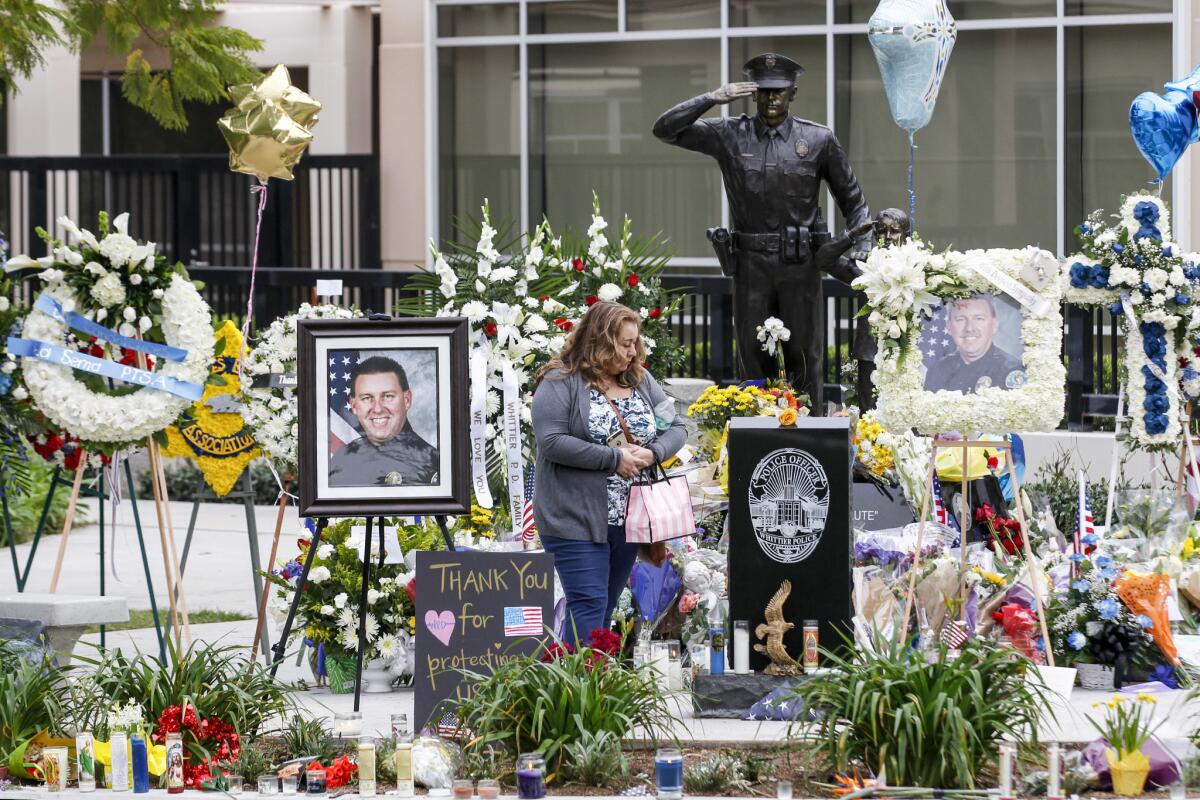County approves a new panel to study criminal justice reform: What’s the impact of downgrading felonies and releasing inmates early?

- Share via
Michael C. Mejia violated his probation several times in the 10 months after he was released from Pelican Bay State Prison in April 2016.
Then, on Feb. 20, authorities say, Mejia gunned down his cousin, followed by the fatal shooting of Whittier police Officer Keith Boyer hours later. He has been charged with two counts of murder.
The officer’s slaying prompted a county investigation into Mejia’s release and his supervision by the L.A. County Probation Department. On Tuesday, it was cited repeatedly as a reason to create a blue-ribbon commission to study the impact of state criminal justice reforms in L.A. County.
Creation of the 27-member panel was approved by the county Board of Supervisors in a 3-0 vote. It will examine the “challenges and opportunities” related to recent state criminal justice reforms.
Those reforms are Assembly Bill 109, passed in 2011; Proposition 47, passed in 2014; and Proposition 57, approved in 2016 but not yet fully implemented. Those measures shifted public safety responsibilities from the state to counties, downgraded some property and drug felonies to misdemeanors, and allowed for the early release of some inmates, respectively.
“This is not a referendum on criminal justice reform efforts,” said Supervisor Janice Hahn, whose district includes Whittier and who coauthored the motion with Supervisor Kathryn Barger. “Instead, this should be a conversation on how we make the reforms that we do have work.”
Discussion at Tuesday’s board meeting, however, often centered on the merits of the reform measures and their effects on crime rates.
“While developed with good intentions, the legislation may have created unintended consequences, placing our public and our first responders at risk,” said L.A. County Sheriff Jim McDonnell, who favored the creation of the commission.
“Negative impacts from these changes have been far-reaching, and crime rates are increasing,” Whittier Mayor Joe Vinatieri said.
Research from the Public Policy Institute of California in 2016 concluded that AB 109 had little effect on the percentage of former inmates who committed another crime and did not cause an increase in violent crimes.
Ivette Ale, with Californians United for a Responsible Budget, called Tuesday’s motion “misguided,” saying it inaccurately linked the killing of Boyer to the passage of reforms.
After Boyer’s death, the California Department of Corrections and Rehabilitation said that AB 109 was not a factor in Mejia’s release and that he had served his full state prison terms. In addition, Mejia’s criminal convictions — for car theft and attempted car theft — came before Proposition 47 and would not have been downgraded.
Under AB 109, however, the L.A. County Probation Department, rather than state prison officials, supervised Mejia after his release.
Several people who spoke at Tuesday’s meeting to oppose formation of the panel pointed out that criminal justice reforms were passed by clear majorities of California voters.
Others argued that the composition of the commission would undermine its purpose.
As proposed in the original motion, 10 of the commission’s members would come from law enforcement and 10 from other areas of government. Only one representative would come from a community-based organization providing reentry services.
“If we are forming a commission that is tied to shooting a police officer and it is law enforcement heavy, how could we expect this commission to come out with an unbiased report or set of recommendations?” said Jose Osuna, external affairs director for Homeboy Industries, a nonprofit that rehabilitates former gang members.
After the public comments, Supervisor Hilda Solis introduced amendments to expand the commission’s membership to 27 to include more people who have been directly affected by the reforms.
Board of Supervisors Chariman Mark Ridley-Thomas called for the motion and amendments to be continued one week so that the board could deliberate further and county attorneys could vet the item.
“It would be ill-advised to adopt anything absent a clear sense of what is being brought before us,” said Ridley-Thomas, who abstained from voting.
Despite his plea, Barger called for a vote. “For those that have looked at this motion … what are you afraid of? We have to have facts,” she said.
Twitter: @AgrawalNina
More to Read
Sign up for Essential California
The most important California stories and recommendations in your inbox every morning.
You may occasionally receive promotional content from the Los Angeles Times.











